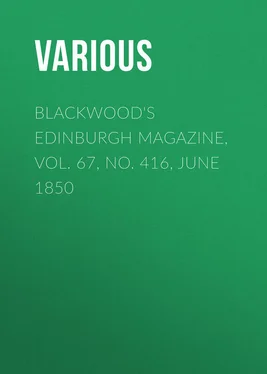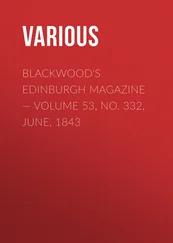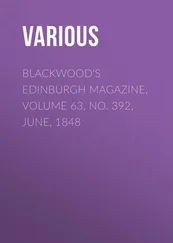Various - Blackwood's Edinburgh Magazine, Vol. 67, No. 416, June 1850
Здесь есть возможность читать онлайн «Various - Blackwood's Edinburgh Magazine, Vol. 67, No. 416, June 1850» — ознакомительный отрывок электронной книги совершенно бесплатно, а после прочтения отрывка купить полную версию. В некоторых случаях можно слушать аудио, скачать через торрент в формате fb2 и присутствует краткое содержание. Издательство: Иностранный паблик, Жанр: periodic, foreign_edu, Путешествия и география, на английском языке. Описание произведения, (предисловие) а так же отзывы посетителей доступны на портале библиотеки ЛибКат.
- Название:Blackwood's Edinburgh Magazine, Vol. 67, No. 416, June 1850
- Автор:
- Издательство:Иностранный паблик
- Жанр:
- Год:неизвестен
- ISBN:нет данных
- Рейтинг книги:5 / 5. Голосов: 1
-
Избранное:Добавить в избранное
- Отзывы:
-
Ваша оценка:
- 100
- 1
- 2
- 3
- 4
- 5
Blackwood's Edinburgh Magazine, Vol. 67, No. 416, June 1850: краткое содержание, описание и аннотация
Предлагаем к чтению аннотацию, описание, краткое содержание или предисловие (зависит от того, что написал сам автор книги «Blackwood's Edinburgh Magazine, Vol. 67, No. 416, June 1850»). Если вы не нашли необходимую информацию о книге — напишите в комментариях, мы постараемся отыскать её.
Blackwood's Edinburgh Magazine, Vol. 67, No. 416, June 1850 — читать онлайн ознакомительный отрывок
Ниже представлен текст книги, разбитый по страницам. Система сохранения места последней прочитанной страницы, позволяет с удобством читать онлайн бесплатно книгу «Blackwood's Edinburgh Magazine, Vol. 67, No. 416, June 1850», без необходимости каждый раз заново искать на чём Вы остановились. Поставьте закладку, и сможете в любой момент перейти на страницу, на которой закончили чтение.
Интервал:
Закладка:
If Mr Carlyle feels that his vocation is political – if the true spirit of the prophet is stirring within him – he ought to endeavour in the first place to think clearly, and, in the second, to amend his style. At present his thoughts are anything but clear. The primary duty of an author is to have a distinct understanding of the matter which he proposes to enunciate, for unless he can arrive at that, his words must necessarily be mystical and undefined. If men are to be taught at all, let the teaching be simple, and level to the common capacity; and let the teacher be thoroughly conversant with the whole particulars of the lesson. We have a strong suspicion that Cassandra must have been a prophetess reared in the same school as Mr Carlyle. Her predictions seem to have been shrouded in such thorough mysticism, that no one gave her credit for inspiration; and in consequence the warnings which might have saved Troy, were spoken to the empty winds. Here, perhaps, we ought to guard ourselves against a similar charge of indistinctness. We by no means intend to certify that Mr Carlyle is a prophet, or that there is any peculiar Revelation in these Latter-day Pamphlets which can avert the fall of Britain, should that sad catastrophe be foredoomed. We simply wish to express our regret that Mr Carlyle, who may lay claim to the possession of some natural genius and ability, will not allow us the privilege of understanding the true nature of his thoughts, and therefore exposes himself to a suspicion that the indistinctness lies quite as much in the original conception of the ideas, as in the language by means of which they are conveyed.
As to his style, it can be defended on no principle whatever. Richter, who used to be his model, was in reality a first-rate master of language and of verbal music; and although in some of his works, he thought fit to adopt a quaint and abrupt manner of writing, in others he exhibited not only great power, but a harmony which is perhaps the rarest accomplishment of the rhetorical artist. His "Meditation on a Field of Battle," for example, is as perfect a strain of music as the best composition of Beethoven. But in Mr Carlyle's sentences and periods, there is no touch or sound of harmony. They are harsh, cramped, and often ungrammatical; totally devoid of all pretension to ease, delicacy, or grace. In short, we pass from the Latter-day Pamphlets with the sincere conviction that the author as a politician is shallow and unsound, obscure and fantastic in his philosophy, and very much to be reprehended for his obstinate attempt to inculcate a bad style, and to deteriorate the simple beauty and pure significancy of our language.
THE HUNGARIAN JOSEPH
The following poem is intended to commemorate a very interesting episode, which lately enlivened the deliberations of the National Reform Association. The usual knot of Parliamentary orators having somewhat cavalierly left the delegates to their own rhetorical resources, on the third day of conference, and the conversation having taken a doleful turn, owing to the paucity of subscriptions, the Chairman, Sir Joshua Walmsley, thought fit to enliven the spirits of the meeting by the introduction of an illustrious visitor. The following extract from the morning papers will explain the incident, as well as the commemorative verses: —
"The Chairman (Sir J. Walmsley) here left the platform, and shortly afterwards returned, leading a short, stout, elderly, intelligent-looking gentleman, with a very formidable mustache and bushy beard of snowy whiteness, whose appearance created considerable excitement in the audience, and gave rise to great satisfaction in the minds of several delegates, who were under the impression that they beheld Mr Muntz, the hon. member for Birmingham, whose beard is so well known by report to the Liberal party.
"The Chairman. – Gentlemen, you observed that I left the platform for a short time, and returned with a gentleman who is now near me. It is no other than the Joseph Hume of the Hungarians. (Loud cheers, followed by cries of 'Name, name.')
"The chairman did not appear able to afford the desired information, and the venerable Hungarian financier wrote his name on a slip of paper, from which Sir Joshua Walmsley read aloud what sounded like 'Eugene Rioschy.' (Cheers; and voices, 'We don't know it now,' 'I can't tell my wife;' and laughter.)
No, no! 'tis false! it cannot be!
When saw a mortal eye
Two suns within the firmament,
Two glories in the sky?
Nay, Walmsley, nay! thy generous heart
Hath all too wide a room:
We'll not believe it, e'en on oath —
There's but one Joseph Hume!
Unsay the word so rashly said;
From hasty praise forbear!
Why bring a foreign Pompey here
Our Cæsar's fame to share?
The buzzard he is lord above,
And Hume is lord below,
So leave him peerless on his perch,
Our solitary Joe!
He may be known, that bearded wight,
In lands beyond the foam;
He may have fought the fiery fight
'Gainst taxes raised at home.
And hate of kings, and scorn of peers,
May rankle in his soul:
But surely never hath he reached
"The tottle of the whole."
Yes, he may tell of doughty deeds,
Of battles lost and won,
Of Austrian imposts bravely spurned
By each reforming Hun.
But dare he say that he hath borne
The jeers of friend and foe,
Yet still prosed on for thirty years
Like our transcendant Joe?
Or hath he stood alone in arms
Against the guileful Greek,
Demanding back his purchase-coin
With oath, and howl, and shriek?
Deemed they to hold with vulgar bonds
That lion in the net?
One sweep of his tremendous paw
Could cancel all their debt.
How could we tell our Spartan wives
That, in this sacred room,
We dared, with impious throats, proclaim
A rival to the Hume?
Our children, in their hour of need,
Might style us England's foes,
If other chief we owned than one,
The member for Montrose.
O soft and sweet are Cobden's tones
As blackbird's in the brake;
And Oldham Fox and Quaker Bright
A merry music make;
And Thompson's voice is clear and strong,
And Kershaw's mild and low,
And nightingales would hush their trill
To list M'Gregor's flow;
But Orpheus' self, in mute despair,
Might drop his magic reed
When Hume vouchsafes, in dulcet strains,
The people's cause to plead.
All other sounds of earth and air
Are mute and lost the while;
The rasping of a thousand saws,
The screeching of the file.
With him we'll live, with him we'll die,
Our lord, our light, our own;
We'll keep all foemen from his face,
All rivals from his throne.
Though Tory prigs, and selfish Whigs,
His onward course assail.
Here stand a hundred delegates,
All joints of Joseph's tail.
Ho, there! remove that hairy Hun
With beard as white as snow;
We need no rank reformers here
To cope with honest Joe.
Not Muntz, with all his bristly pride,
From him our hearts can wean:
We know his ancient battle-cry —
"Shave close, my friends, and clean!"
MY PENINSULAR MEDAL
BY AN OLD PENINSULAR
PART VII. – CHAPTER XVII
Although I have not specified every place at which we halted, or through which we passed, it may be proper to state that we arrived in due course at St Sever, which was distant only one day's march from the actual headquarters of the British army, Aire on the Adour. Here Pledget interposed his professional authority, and decided that neither Mr Chesterfield nor Jones must proceed farther. They both remained, therefore, under surgical treatment at St Sever. Pledget and Gingham, deeming the road now safe, pushed forward to Aire, leaving the cart to follow with the convoy. At the same time, our numbers experienced a still more considerable diminution. Our cavalry escort, also, received orders to push forward, and started before us in high spirits, with the prospect of immediate operations. The convoy was, accordingly, left with only the infantry as a guard, under Corporal Fraser.
Читать дальшеИнтервал:
Закладка:
Похожие книги на «Blackwood's Edinburgh Magazine, Vol. 67, No. 416, June 1850»
Представляем Вашему вниманию похожие книги на «Blackwood's Edinburgh Magazine, Vol. 67, No. 416, June 1850» списком для выбора. Мы отобрали схожую по названию и смыслу литературу в надежде предоставить читателям больше вариантов отыскать новые, интересные, ещё непрочитанные произведения.
Обсуждение, отзывы о книге «Blackwood's Edinburgh Magazine, Vol. 67, No. 416, June 1850» и просто собственные мнения читателей. Оставьте ваши комментарии, напишите, что Вы думаете о произведении, его смысле или главных героях. Укажите что конкретно понравилось, а что нет, и почему Вы так считаете.












